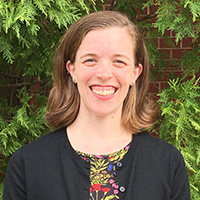NCCETC Training Program Update
 The N.C. Clean Energy Technology Center (NCCETC) wishes Senior Training Specialist Megan Berry well as she resigns from her position to begin new adventures in England!
The N.C. Clean Energy Technology Center (NCCETC) wishes Senior Training Specialist Megan Berry well as she resigns from her position to begin new adventures in England!
Berry has been running NCCETC’s training program for three years, helping individuals receive the training and credentials needed to hit the ground running in the clean energy workforce.
During her time at the NCCETC, Berry delivered the Renewable Energy Technologies Diploma Series, grew the overall training program, and spoke on several panels about opportunities for careers in clean energy, including a focus on diversity, equity, and inclusion in the industry – including the career panel for the Women in Environment Conference held by the NC State College of Natural Resources, and Developing our Future Workforce panel at the NCBPA Workforce Development Summit. She delivered several Fundamentals of PV Design and Installation training workshops to underrepresented populations and university and community college students. Berry also served on the Workforce Training Working Group for the Energy Efficiency Roadmap, which is featured in the NC DEQ Clean Energy Plan created as part of Executive Order 80.
“I’ve really enjoyed my time here at the NCCETC over the past few years,” Berry said. “I consider myself lucky to have had the opportunity to work alongside so many great partners to make an impact on the clean energy workforce in NC and around the United States.”
Berry said her favorite part of working at the Center was spending time with trainees.
“I’ve enjoyed getting to know our training participants and to help them achieve their goals, whether it was to enter the industry or further their education,” Berry said. “They are the reason this program exists and why I loved this job as much as I did.”
Berry said that while things may seem uncertain right now because of COVID-19 and its effects, the future of the clean energy industry is still bright and there will continue to be growth and opportunities for people with diverse skill sets and experiences to start a new career or advance their current career in the industry.
“I’m sad to be leaving, but I know the training program is in more than capable hands with Allison, and I’m excited to see the new opportunities she’ll bring to the position to keep the clean energy workforce momentum going,” Berry said.
 Allison Carr, previous Clean Transportation Specialist, has temporarily transitioned to Interim Training Specialist, to continue the great work Berry has accomplished with the training program.
Allison Carr, previous Clean Transportation Specialist, has temporarily transitioned to Interim Training Specialist, to continue the great work Berry has accomplished with the training program.
Carr, who holds a B.S. in Environmental Science from University of North Carolina at Chapel Hill and a Master of Environmental Management degree from the Nicholas School at Duke University, has worked on the NCCETC Clean Transportation team for three years to support the development and implementation of training, outreach, events and policy research. Previously, she worked as Clean Energy Policy Analyst for the British Consulate-General and as a Senior Air Quality Planner at the Houston-Galveston Area Council.
In her new role of Interim Training Specialist, Carr plans to find and create new resources for engaging with future training students and experts in the industry, as well as highlight current instructors and courses through videos, webinars or podcasts.
“I hope to find ways to connect with anybody who might be interested in learning more about clean energy training opportunities,” Carr said. “I’m exploring possibilities for hosting more interactive and frequent ways to share with the clean energy community and networks.”
Carr said she also plans to identify new partnerships that can help the Center make its training offerings more widely available and accessible to a larger audience.
“I think there is a need for continued education and training in the clean energy industry where we continue to see new technologies and best practices implemented – in areas like electric vehicle infrastructure installation, solar operations and maintenance using drones or satellite information, or using new data technologies to improve operations of distributed energy resources (DERs),” Carr said.
The current challenges we’re facing in the ways we work and live will impact and be impacted by the ways that we use energy, Carr said.
“Clean energy training is important because the industry will continue to grow, evolve, and change rapidly over time,” Carr said. “I believe that learning from experiences is important. Local governments and local businesses are deploying clean energy, like solar or electric vehicles fleets. I hope we can help share the lessons they learn through their ongoing efforts. And I believe that new data technologies are capturing new information that can teach us a lot, too. Training workshops and courses can provide the tools needed so we can use data to improve the real world operations of our energy resources.”
Carr said that what she is looking forward to most is working with a diverse group of stakeholders, instructors, and students.
“We have the opportunity to share resources and expertise with students who have diverse backgrounds and who may be working in different sectors or industries,” Carr said. “New clean energy jobs and opportunities intersect with many existing roles in engineering, policy, law, military operations, and even disaster response or preparedness. I really enjoy the interdisciplinary nature of the clean energy industry and hope to contribute to knowledge sharing across different sectors.”
To learn more about NCCETC training and to see what courses are coming up and available, visit the website here. Be sure to check out our online opportunities here.
If you have new training ideas or have questions, contact Allison Carr here.